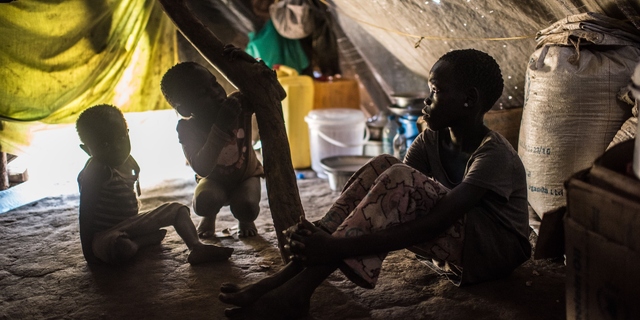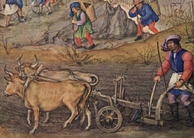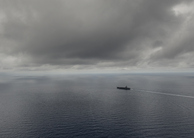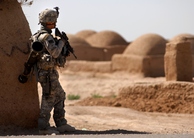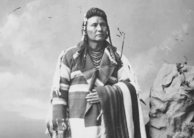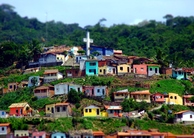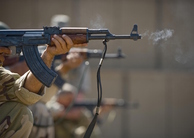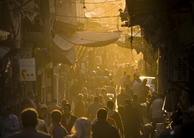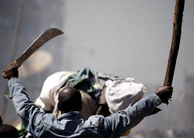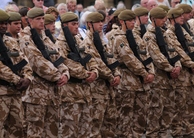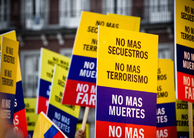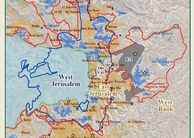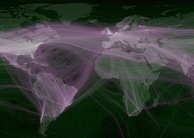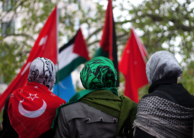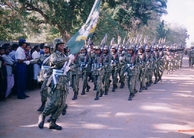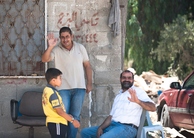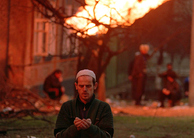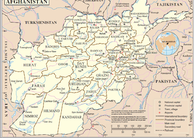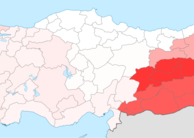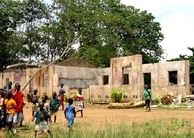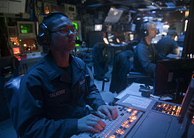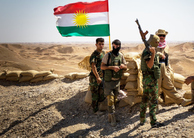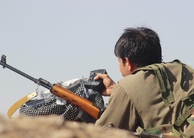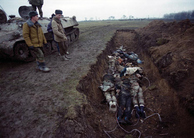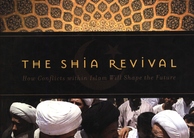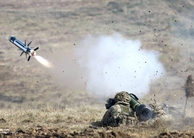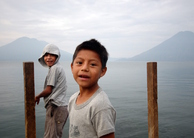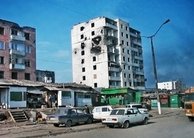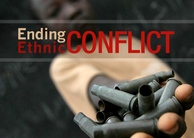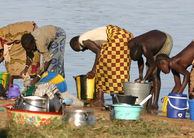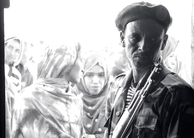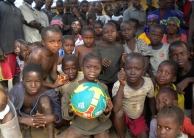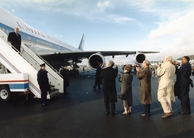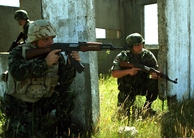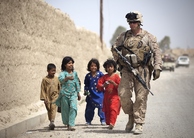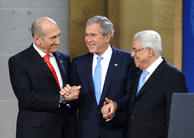|
Conflict (tagged articles)
The keyword Conflict is tagged in the following 61 articles.
2021, Vol. 13 No. 01
Israel has increased the nation’s security presence around the Gaza Strip and in the West Bank. Here, the research project analyzes how transaction costs resulting from Israeli security policy impact the output of manufacturing activities... Read Article »
2020, Vol. 2020 No. 1
This research paper investigates the impact that the rhetoric of a populist conservative ethnic entrepreneur can have on ethnic Conflict by analyzing the tweets of Indian Prime Minister Narendra Modi. Over the years, the emergence of right-wing... Read Article »
2019, Vol. 11 No. 02
The corpus of Older Scots literature is hyper-attentive to the themes and issues surrounding nationhood and sovereignty. Authors of the fifteenth and sixteenth centuries often espoused and exploited the national pride of the Scottish people, producing... Read Article »
2017, Vol. 9 No. 11
South Sudan is the youngest and one of the most volatile nations in the world. After two decades of war, it gained its independence from Sudan in 2011. Peace, however, was short-lived. As oil prices plummeted and competition intensified, an ill-... Read Article »
2017, Vol. 10 No. 2
In recent decades, Japan and South Korea have become hosts to ethnic return migrants who have returned to their ancestral homeland after once emigrating overseas. Since the 1980s, the Brazilian nikkeijin, or members of the Japanese diaspora, have... Read Article »
2016, Vol. 7 No. 1
Foreign policymakers, academics, and regional pundits have all acknowledged the importance of the South China Sea. This region, rich in resources and trade, is the subject of intense territorial contest and is perpetually at risk for escalation... Read Article »
2016, Vol. 7 No. 1
The consensus in scholarly circles regarding democratic consolidation stipulates the importance of a cohesive demos, or population, that is also congruent with a representative polity, or political class. One of the main inhibitors of this goal... Read Article »
2016, Vol. 7 No. 1
The rise of modernized and efficient militaries competing for dominance against the United States' military has resulted in increased eruptions of Conflict globally. A majority of decisions by the Joint Chiefs and EUCOM about long-term U.S. military... Read Article »
2016, Vol. 8 No. 11
In the early 1990s, two terrorist organizations, Hamas and the Fatah-led Palestinian Liberation Organization (PLO), were using terrorism to promote their political plight of Palestinian self-determination. Although both organizations vowed to use... Read Article »
2016, Vol. 8 No. 11
Following the end of the American Revolutionary War of 1776 to 1783, the U.S. government adopted an aggressive and expansionistic policy towards Native Americans on its frontiers. From the closing years of the 18th century to the end of the 19th... Read Article »
2016, Vol. 2015/2016 No. 3
In 1993, Israeli Prime Minister Yitzhak Rabin dismissed the possibility of negotiating with leaders of the Palestine Liberation Organization (PLO), claiming that there is no sense in talking to a terrorist organization. Meanwhile, as it later became... Read Article »
2016, Vol. 6 No. 2
Both gangs and police in Rio de Janeiro seemingly operate irrationally in an extended Conflict, as it is highly unlikely that the state will make drug dealing legal, and it is also unlikely that gangs would be able to destroy the police through... Read Article »
2016, Vol. 9 No. 2
We need […] peace without impunity. I understand that in the balance between peace and justice, this balance needs some sacrifice on the part of justice, but we cannot accept impunity. – Former Colombian President... Read Article »
2016, Vol. 8 No. 04
In public discourse, Africa and the Middle East have become synonymous with ethnic and religious Conflict, whereas Europe is known as a bastion of peace and stability. But are areas known for their ‘high Conflict’ truly more susceptible... Read Article »
2015, Vol. 7 No. 10
Headlines are littered with the rhetoric of the powerful. The most present modern crises can ostensibly be reduced to deconstructed, decontextualized and digestible echoes of our world leaders. The Syrian case is not disqualified from this reductionist... Read Article »
2015, Vol. 7 No. 10
This paper address two overarching research questions: first, what is the role of religion in transitional justice? Second, does the religious approach to transitional justice differ from the secular approach, and if so, how? In a theoretical section... Read Article »
2015, Vol. 7 No. 07
The civil war in Syria has taken an enormous toll on civilian populations. One of the most commonly overlooked aspect of this crisis is the impact on healthcare in the region. Syria’s health capacity has been ravaged by years of government... Read Article »
2015, Vol. 5 No. 1
Supporting participants in intrastate Conflict often appears as a relatively cheap, effective strategy to address security concerns by weakening and distracting enemies participating in those Conflicts if not by outright eliminating them. Rebels... Read Article »
2015, Vol. 8 No. 2
Colombia has had the longest internal armed Conflict in the Western Hemisphere, which has delayed the development of a true democratic system where the government protects individual rights and liberties [1]. The prolonged Conflict is a consequence... Read Article »
2015, Vol. 2014/2015 No. 1
If I belonged to the majority of the Israeli public I might call this paper ‘A journey along an Israeli neighbourhood – discovering the many sides of Jerusalem’. If my origins were different, perhaps the title would be: ‘... Read Article »
2014, Vol. 4 No. 2
Prospect theory, a behavioral economic theory first proposed by David Kahneman and Amos Tversky in 1979, has evolved into a seminal theory on risk decision-making applicable in a wide range of fields. Yet in both political science and international... Read Article »
2014, Vol. 5 No. 1
This study sought to take the pulse on the modern Israeli-Palestinian Conflict by analyzing primary sources from online Palestinian news organizations. Thirty articles were selected including editorials, opinion and news analysis pieces. The author... Read Article »
2014, Vol. 7 No. 2
Since the start of the Sri Lankan Civil War in 1983, Tamil women have occupied a key role in the Conflict. In the struggle for the anticipated state of Tamil Eelam, the socio-cultural role of women underwent, and continues to undergo, a radical... Read Article »
2014, Vol. 7 No. 2
Rimaz Kasabreh is Palestinian. Because of her Israeli-issued green identification card, she is considered a legal resident of the West Bank but an illegal immigration within nearby East Jerusalem – the historically Palestinian-controlled half... Read Article »
2014, Vol. 7 No. 2
In the ultimate years of the Soviet Union, as the liberalizations introduced by perestroika and glasnost took full effect, the nationalistic convictions of historically discriminated territories within the Russian and Central Asian region began... Read Article »
2014, Vol. 6 No. 04
After 35 years of war in Afghanistan[1], the year 2014 brings two milestones capable of major impact on the future – for better or worse. Firstly, the presidential elections that took place in early April, so far reported to be relatively... Read Article »
2014, Vol. 6 No. 03
Like the theories that explain it, group Conflict has existed since man became a social creature. Nevertheless, social scientists remain frustrated in their attempts to explain ethnic Conflict in any generalizable pattern. Social political theories... Read Article »
2013, Vol. 4 No. 1
The rise of Islamist militant groups and their propensity towards violence has perplexed researchers and policy-makers and lead to debate about how to handle this evolving asymmetric threat. However the general focus of past research has been on... Read Article »
2013, Vol. 7 No. 1
Why did Sierra Leone experience such a protracted civil war between 1991 and 2002? Sierra Leone has been beset with challenges since achieving independence from Britain in 1961, in particular its brutal civil war that resulted in tens of thousands... Read Article »
2013, Vol. 5 No. 10
'Attack' is a term of central importance in the Law of Armed Conflict, the body of international rules and standards that regulate conduct in armed Conflict (jus in bello). A 1977 amendment to the Geneva Conventions of 1949, 'Protocol I,' defines... Read Article »
2013, Vol. 5 No. 09
This article aims to investigate the effects of moderators such as culture, power dynamics and political factors on the negotiation behavior and processes displayed in a dyadic, geopolitical negotiation scenario by using a hybrid model of well-established... Read Article »
2013, Vol. 3 No. 1
Widely known as a tropical tourist destination, the Fiji Islands have been gripped by political turmoil and have had four coups in a span of 20 years. Various factors such as tradition versus modernity, military-civilian relations, failure of constitutionality... Read Article »
2013, Vol. 5 No. 01
Unfortunately, the Caucasus often conjure images of violence and war in the minds of many people. Indeed, the region has been plagued by violent Conflict especially during the collapse of the Soviet Union and through the first decade of independence... Read Article »
2012, Vol. 2 No. 1
The last decade of American military policy has been dedicated to fighting an enigma – how to wage war against an enemy that does not think, act, or fight like we do; an enemy that wears no uniform, utilizes any tactic, and swears its allegiance... Read Article »
2012, Vol. 2 No. 1
Over the past 20 years, the international order has been characterized by the Conflict between the United States' desire for isolationism and its desire to maintain hegemony. While the United States has initiated and continued wars in Afghanistan... Read Article »
2012, Vol. 6 No. 1
In 1999, the Russian government all but razed Chechnya’s capital city of Groznyy. The Russian military devastated Chechnya, killing thousands of civilians and wiping out vital infrastructure, signifying the capstone in a campaign of destruction... Read Article »
2012, Vol. 4 No. 08
A public good is defined as a product or service that is both non-rival and non-excludable, meaning that one cannot withhold it from another without precluding all others from benefitting from it as well.[1] Examples of such products have come to... Read Article »
2012, Vol. 4 No. 08
The question of whether economic relations have an impact on interstate military Conflict has divided scholars and political thinkers since the Enlightenment. Kant claimed that economic interconnectedness among states would contribute to long-term... Read Article »
2012, Vol. 4 No. 08
The relationship between trade and Conflicts between countries in South Asia is important to examine because of the rising prominence of this region of the world. Security issues are of utmost concern when considering the damaging effects that armed... Read Article »
2012, Vol. 4 No. 04
In his book The Shia Revival: How Conflicts within Islam Will Shape the Future (2006), Vali Nasr addresses an issue that is gaining increased importance in the contemporary coverage of global Islam: Sunni-Shia relations. Vali Nasr is a widely respected... Read Article »
2012, Vol. 4 No. 02
Climate change negotiations have been on the international stage for almost four decades. They have a complex history, and act as a comprehensive example of the many variables, obstacles, environments, and processes that can affect any international... Read Article »
2012, Vol. 4 No. 01
The level of displacement surrounding the Israel-Palestinian Conflict is astounding. At this point there are over nine million Palestinian refugees scattered throughout the globe (King-Irani 924,). Arguing that their situation is dehumanizing and... Read Article »
2011, Vol. 3 No. 06
The Israeli-Palestinian Conflict is a perplexing problem that weighs heavily on the world. For over seventy-five years, blood has been spilt over a piece of land about the size of New Jersey. Numerous attempts have been made to find peace in what... Read Article »
2011, Vol. 3 No. 04
The problems associated with democratic reform in the Democratic Republic of the Congo (DRC) are manifold. While the name of the country surely lends itself to an assumption of regime type, in actuality, this area has experienced great civil unrest... Read Article »
2011, Vol. 3 No. 04
International Humanitarian Law, based on the concepts of jus ad bello, is defined to be the law of war. This means that the laws involved are meant to be active in a situation of an armed Conflict or during war. However, just like international... Read Article »
2011, Vol. 3 No. 03
Violence undermines an inclusive national identity that considers those of other races, classes and creeds as compatriots, for as Mirowsky and Ross (1983: 238) note, “When other people in one’s life have become a hostile army, social... Read Article »
2011, Vol. 3 No. 03
In the aftermath of mass violence and terror, nations are left in a state of disillusionment, fear, and often a lack of state legitimacy. In this atmosphere many nations have resorted to using different forms of reconciliation and peace-building... Read Article »
2011, Vol. 3 No. 02
The Republic of Chechnya in Russia’s North Caucasus region has drawn significant attention for being host to remarkable instability, thriving terrorism, and a staggering display of human rights violations over the past two decades, including... Read Article »
2011, Vol. 3 No. 01
Although peace and pacifism are familiar ideas to most students today, for much of human history these concepts have been relegated to the religious domain and excluded from the study and practice of politics.[1] At the same time, war--organized... Read Article »
2011, Vol. 3 No. 01
“Human security means protecting vital freedoms. It means protecting people from critical and pervasive threats and situations, building on their strengths and aspirations. It also means creating systems that give people the building blocks... Read Article »
2010, Vol. 4 No. 1
The Niger Delta Conflict is one created and exacerbated by the oil and natural gas riches of the region. Great hydrocarbon wealth has been extracted over the past decades, yet Delta residents continue to live in underdeveloped and polluted circumstances... Read Article »
2010, Vol. 2 No. 06
Conflict management in the Horn of Africa has been relatively unsuccessful. Foreign colonialism created boundaries that have yet to be resolved, and newly independent nations engaged in Conflicts responsible for human rights atrocities, child conscription... Read Article »
2010, Vol. 2 No. 05
There is a growing consensus that the prevalence of a large youth population is not conducive to peace and that such a ‘youth bulge’ can even increase the risk of civil Conflict and political violence.[1] Richard Cincotta and Elizabeth... Read Article »
2010, Vol. 2 No. 04
The year 1993 was not a good one for Bill Clinton. An exception, perhaps, being the morning of January 20th when he stood at the west front of the United States Capitol building and took the Oath of Office to become the forty- second President of... Read Article »
2010, Vol. 3 No. 2
"Our forces were vastly superior to the rebels. Then why couldn't we finish with them quickly? Because they managed to mobilize the population through terror and persuasion. It was therefore imperative that we isolate the rebels from the population... Read Article »
2010, Vol. 2 No. 04
North and South is a novel defined by the resolution of binary Conflicts: heroine Margaret Hale is presented with a number of divisions of sympathy, between industrialists and the working class, between Conflicting views of Mr. Thornton, and even... Read Article »
2009, Vol. 1 No. 12
It is mid-1998. On news programs in the United States, the issue of intervention in Kosovo is addressed as a prevalent concern. It is at least mentioned in every presentation: any progress that's been made or any possible change is offered to the... Read Article »
2009, Vol. 1 No. 10
Nearly eight years into the war, the security situation in Afghanistan appears to be deteriorating at an increasingly fast past. Areas that were previously secured have been retaken by militants; significant increases in civilian casualties, caused... Read Article »
2009, Vol. 2 No. 2
This ongoing dispute clearly concerns the United States, the long-term third party in peace negotiations, and a close ally of Israel. However, now more than ever European and Middle Eastern states are invested in the resolution of this Conflict.... Read Article »
1997, Vol. 1996/1997 No. 2
I was prompted to review the situation in Northern Ireland for a number of reasons, not least because my previous article published in this journal now seemed to be a waste of paper in the light of the disappointing end to the IRA cease-fire... Read Article »
1997, Vol. 1996/1997 No. 2
War has been an ever present phenomenon in the international system. A solution to this problem has eluded policy-makers and international relations theorists, until now. Thomas Friedman, of the New York Times, has come up with a new prescription... Read Article »
Expedited Article Review
Submit an article and get a decision fast.
If you need a fast decision, INQUIRIES Journal offers expedited processing of your submission for a small fee. Depending on the expedited review option you choose, you can receive a decision in as few as 5-days.
In addition to a shorter review period, the fee supports the journal's continued operation and open-access publishing model. Standard submissions are always free. Submit Now » - Submit an Article to Inquiries Journal -
|




